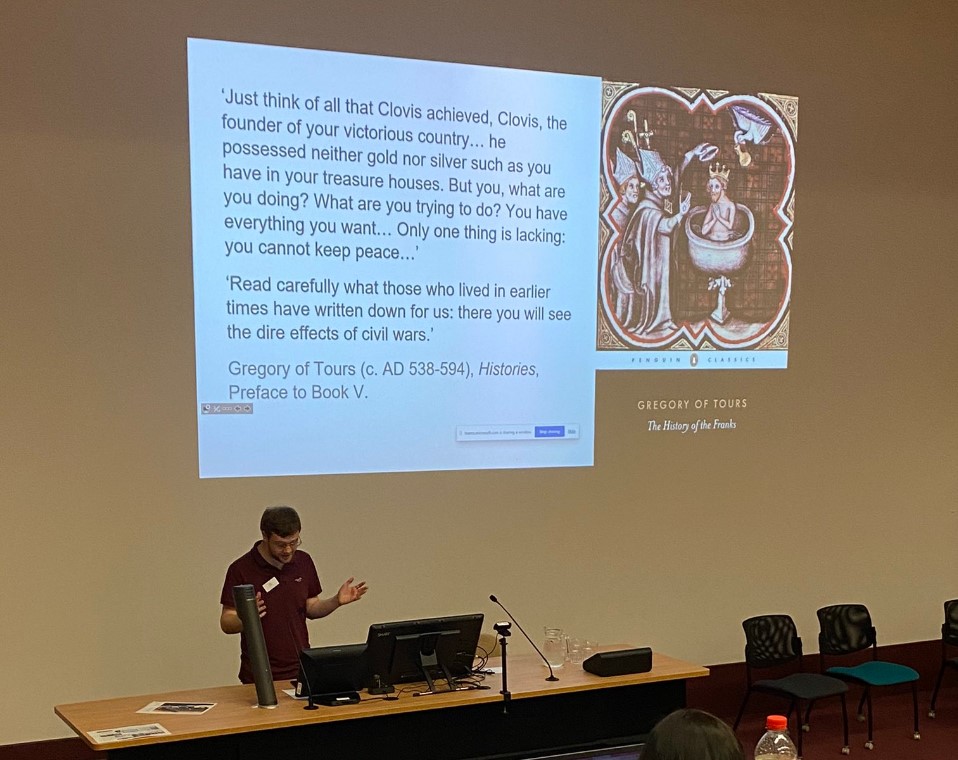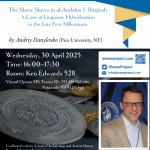Conference Report: Irrelevance, Irreverence, and Slavery
- Erin Thomas Dailey
- 31 July 2023
- 0 Comment

Photo credit: organisers of HistoryCon
In this blog post, our researcher, James Burns, summarises a conference paper he gave on the importance and pleasure of ‘irrelevant’ medieval history. He then considers how the history of early medieval slavery fits in. Can we ever enjoy researching it? How can we make such research relevant to the present, and should we even try to do so?
I. Reckoning with irrelevance
On 9th June, the ‘History in crisis: why it matters’ University of Kent PGR-led conference took place. The conference saw some fascinating discussions, and it was nice that Kent’s academic staff turned up to support it. I gave a paper arguing that history is sometimes irrelevant and that is a good thing. It was a slightly tongue-in-cheek response to defences of studying history that rest on establishing its relevance to present-day political debates, which frequently (but not exclusively) take the form of arguments for studying specific areas of modern history—but which don’t do much by way of justifying medieval history, or at worst imply that medieval history is a distraction from more worthy subjects of study.
There are ways in which medieval history can (and arguably should) speak to contemporary issues. But every time we argue that something needs to be on the curriculum because otherwise we cannot understand the 21st century, or when we stress the contemporary relevance of our research on a funding application, we are implicitly asking people to consider other areas of history as less important than our own. This does not seem conducive to justifying the practice of history as a whole.
So my paper suggested that, if we find something interesting, enjoyable, or distracting from the present, that should be enough to justify studying it. When something appears so foreign from our own concerns, but occupies the attention of a source, that can inspire fruitful research questions. Besides, amusing anecdotes, striking facts, dramatic narrative (and what on earth we can make of it all) are some of the pleasures of history—pleasures which can sustain us amid personal fatigue and discontent with the state of the world at large.
Governments spend billions of dollars on new space telescopes that add to our knowledge of the universe, but which have basically no practical or material benefit. Historians, with a fraction of the budget of astronomers, should be allowed to feel content with merely increasing understanding of the past.
But I want to emphasise that my point was that historical studies don’t have to engage in present-day political debates to be worthwhile—not that they should avoid doing this altogether. When politicians claim that history has become too political, they forget that many of the great ancient historians wrote with very strong agendas. The sixth-century bishop Gregory of Tours expressed a hope, in his Histories, that his contemporaries would read about earlier times and learn about the disastrous consequences of civil war. He hoped that they would look at the achievements of Clovis, who founded the Frankish kingdom, despite, in Gregory’s words, possessing neither gold nor silver, and reflect on how the fortunes of his successors, who indulged in luxury, compared. Gregory wanted his audience to apply the lessons of history to the present.
Yet 1,400 years later, when I read Gregory’s Histories, as someone who isn’t a royal warlord or a bishop with a sermon to preach, what I primarily get is enjoyment: a chance to escape to a different world, where there may be intriguing modern parallels, but a world which above all sucks you in and absorbs you in myriad fascinating details. Fittingly enough, one such instance that gives escapism is Gregory’s account of an escape—of a priest from a marble sarcophagus, which a drunken bishop had imprisoned him in, trapped next to the fetid body of the tomb’s original inhabitant. The way stories like this can immerse the reader helps us to understand the enduring appeal of primary sources, and their persuasiveness as texts. In fact, despite Gregory’s despair at his own times and call for change, I suspect he wanted his reader to be entertained—not least so they remembered what he wrote.
II. Reckoning with irreverence
Yet escapism isn’t always possible, and it is not always appropriate. Especially when we are dealing with a subject such as slavery, and, by extension, torture, abuse, and rape. There is a risk of getting caught up in the drama of Gregory’s narratives at the expense of serious, clear-sighted analysis. We must never let the pleasure of reading medieval sources blind us to the violence and inequality that permeated these societies, or let it lead us to irreverent interpretations.
How should I feel when doing my research? What happens when I read a passage in a historical source that is intentionally amusing, when it concerns a subject as sombre as slavery? These questions are complicated by the fact that, because neither I nor my recent ancestors have been enslaved, I might feel very differently than other historians—a reality that is in no way diminished by the great chronological distance which we all stand from the medieval material in question.
There is a story in Gregory of Tours about two slaves who outwit their owner and escape in the night. Academics have long noted its ‘romantic’ appeal, and it includes this standout moment:
Leo followed his master’s son in law to his bedroom with a drink. As Leo handed it to him, this man said to Leo: ‘Tell me, you whom my master trusts so completely, now that you have a chance, why don’t you steal your horses and set off home?’ He was in good humour and he said this as a joke. Leo replied in the same jesting vein, but was telling the truth: ‘This very night I will think about it, for it may indeed be God’s will.’ [Lewis Thorpe’s translation]
Reading this passage, it is difficult to be anything other than amused, and indeed impressed at Leo’s witty, brazen reply. Would laughter be an inappropriate response to a story that is inherently humorous? As a historian, I know that the situation of slaves was hard and miserable, yet I also know that there were also probably occasional moments when certain slaves experienced chances to triumph over their owners or have a joke at their expense, which served as a source of joy.
Regardless of whether Gregory, who loved irony, invented this incident, it forms part of our evidence base for slavery in sixth-century Gaul. And, as someone who likes analysing history, I am always thrilled to come across a fascinating piece of evidence. Ultimately, what we should judge ourselves on is not whether, like historians of other subjects, we enjoy our research, but whether our resulting analysis respects the dignity of the enslaved and recognises the violence they suffered.
III. Reckoning with slavery
After my paper, I was asked about how historians should reckon with ‘legacy’. Indeed, if asked to name a relevant historical topic many people would say slavery, thinking of the recent attempts by high profile institutions to investigate their links with transatlantic slavery and to consider the implications (e.g. paying reparations).
To what extent is early medieval slavery relevant to these conversations? This is a tricky, complex subject, and deserves fuller consideration than I give it here. But a few cautious observations. As in the early modern period, institutions like the church were deeply involved in early medieval slavery. Historians have shown this clearly. Furthermore, lots of the kings, queens, and nobles who patronised churches—like some of the eighteenth-century donors to the Church of England who have attracted scrutiny in its recent report—were also slaveholders.
It is tempting to argue, then, that the Early Middle Ages should be a relevant consideration when institutions with medieval origins try to confront their legacies of slavery. Yet it is also easy to see how involving early medieval slavery could be seen as an attempt to distract from transatlantic slavery, the lasting impacts of which are more keenly felt today, along with being simpler to quantify, clarify, and trace to the twenty-first century. Perhaps the most scholarship of early medieval European slavery can contribute—without accusations that it is feebly and offensively emphasising that ‘white people were slaves too’—is background context, so people at least know how it was different to transatlantic slavery. But this would be to make early modern enslaved Africans our reason to study early medieval slaves, which does justice to neither. Instead, the challenge should be to think about the distinctive ways slavery in the Early Middle Ages could be relevant to contemporary political and social discourse.
For the moment, however, I am putting this challenge aside. Studying early medieval slavery can reveal interesting things about the past, about early medieval communities, about human beings, which, for me, is enough to make an important area of historical research. The present can come later.





